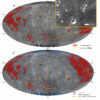A small drug molecule that appears to protect normal tissue from the damaging effects of radiation, may simultaneously be able to boost the cancer-killing effect of radiation therapy, according to a new study led by scientists at University of Iowa, University of Texas Southwestern Medical Center, and Galera Therapeutics, Inc.
The study, published online May 12 in Science Translational Medicine, suggests that the drug’s dual effect is based on a fundamental difference between the ability of cancer cells and healthy cells to withstand the damaging effects of a highly reactive molecule called hydrogen peroxide, which is produced during the dismutation of superoxide.
The drug, known as Avasopasem manganese, is made by Galera Therapeutics. It acts like a natural enzyme called superoxide dismutase and converts superoxide into hydrogen peroxide. Based on its ability to “mop up” damaging superoxide molecules, which are produced by radiation treatment, the drug is currently in clinical trials to test its ability to protect mucosal tissue from the side-effect of radiotherapy.
Since radiation generates large amounts of superoxide, combining the drug with radiation therapy can generate high levels of hydrogen peroxide. This does not harm normal tissue because healthy cells have metabolic systems that remove hydrogen peroxide. In contrast, cancer cells, which are biologically abnormal, can be overwhelmed by high levels of hydrogen peroxide.
“Cancer cells and healthy cells respond very differently to the increased amount of hydrogen peroxide,” says Douglas Spitz, Ph.D., UI professor of radiation oncology and co-lead author of the study. “Our study shows that Avasopasem manganese interacts synergistically with high doses of radiation to create hydrogen peroxide that selectively kill cancer cells but is relatively harmless to normal tissue.”
The study showed that in mouse models of lung and pancreatic cancer the drug synergized with radiotherapy to such an extent that the treatment was able to destroy the tumors. The study also showed the greatest synergy occurred with high daily dose radiotherapy, similar to the doses delivered with Stereotactic Body Radiation Therapy (SBRT) currently used to treat some patients with cancer.
The researchers used several experiments to confirm that hydrogen peroxide was the key component in the synergistic effect. They showed the effect was blocked by adding in an enzyme that removes hydrogen peroxide and was enhanced when hydrogen peroxide breakdown was prevented.
“These findings are the result of collaborative efforts over several years by scientists primarily at Iowa, UT Southwestern Medical Center, and Galera, and are already being translated into several ongoing clinical studies,” adds Spitz, who is a member of Holden Comprehensive Cancer Center at the UI. “One of those early phase trials recently reported that Avasopasem manganese in combination with high daily dose radiotherapy appears to nearly double overall survival in patients with pancreatic cancer compared to a placebo plus the same radiotherapy. Our study lays out the novel scientific basis for this potentially ground-breaking therapy for patients.”
Common antiseptic could be cheap and easy way to improve cancer radiotherapy around the world
More information:
Brock J. Sishc et al, Avasopasem manganese synergizes with hypofractionated radiation to ablate tumors through the generation of hydrogen peroxide, Science Translational Medicine (2021). DOI: 10.1126/scitranslmed.abb3768
Provided by
University of Iowa
Citation:
Hydrogen peroxide-producing drug boosts cancer-killing effect of radiotherapy (2021, May 13)
retrieved 13 May 2021
from https://medicalxpress.com/news/2021-05-hydrogen-peroxide-producing-drug-boosts-cancer-killing.html
This document is subject to copyright. Apart from any fair dealing for the purpose of private study or research, no
part may be reproduced without the written permission. The content is provided for information purposes only.



